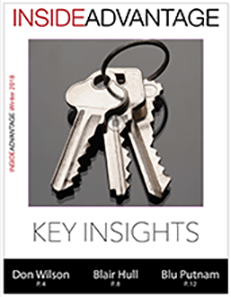Trader Trait #10: Rugged Individualism
In our nation literally founded on a Declaration of Independence, it’s a nearly golden rule: If you want something done right, you’ve got to do it yourself. Perhaps nowhere is an independent streak more pronounced than in our trading industry, where each of us lives or dies on our own steam. The trouble is, perhaps nowhere is the concept less appropriate than when managing one’s personal wealth.
In determining, implementing and maintaining an investment strategy for your personal wealth, we encourage you to seek a wealth advisor who demonstrates his or her willingness and ability to:
- Help you adjust your sights on the key tenets described in our sidebar, “A Strategy for Sound Investing.”
- For the trading community in particular, help you move from the perspective of treating all your wealth as a single, liquid source of ATM-style cash for every facet of your life, to assigning different roles for different portions of your wealth. By deliberately structuring each portion for the distinct role it plays, you can shift from ad hoc, reactionary spending to more sustainable, goals-based wealth management, to satisfy the full spectrum of your complex personal and professional life.
- Serve in a fiduciary capacity, representing your highest interests first.
On that final point, when seeking an advisor for your wealth and investments, we consider this a question worth asking upfront, to narrow the search quickly and considerably:
Will our relationship be fiduciary (i.e., in MY highest financial interests)?
A fiduciary standard of care is the highest legal duty that one party can have to another. It is in contrast to, and far surpassing, the suitability standard present in many brokerage firm relationships.
The difference is related to the central mission of the entity to whom you’re considering delegating your wealth management. If among the firm’s underlying businesses is to broker trades, its business models and sources of compensation are typically structured accordingly. Any advice (considered “secondary” by financial regulators) must be suitable, but it can be influenced by the firm’s other interests. For example, one suitable product may be touted over another because it earns the broker higher commissions while costing you more. This is clearly not in your highest interests, but in a suitability relationship, it’s permitted — without even requiring that the specific conflict be disclosed to you. It’s assumed that you’re aware of the suitability arrangement in

In a fiduciary relationship, the sole business is to provide you with sound investment advice pertaining to your wealth management needs. Under these conditions, your fiduciary advisor is obligated by legal and regulatory duty — and typically appropriately aligned business goals and compensation models — to prioritize your highest financial interests ahead of any other considerations when providing you with his or her advice.
Unfortunately, on the surface, you’re likely to encounter similarly comforting language regardless of the formal relationship, which makes it difficult to differentiate one kind of advisor from another when conducting your due diligence. It’s our experience that investors often assume the existence of a fiduciary relationship or the approximate equivalent, even when it’s simply not there. To know for sure whether the relationship is fiduciary or merely suitability, we recommend asking the question directly, and ensuring that it’s confirmed in writing.






